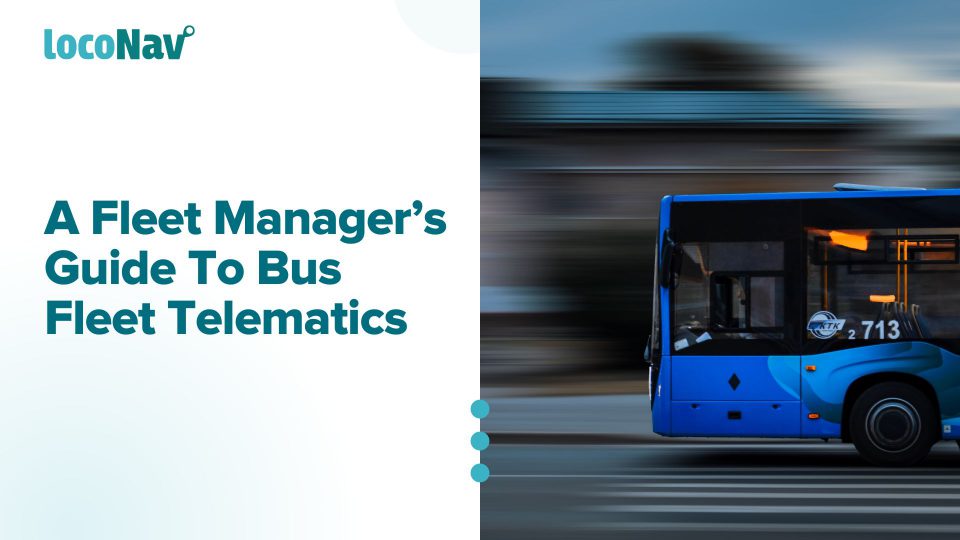

Public transportation plays a crucial role in enhancing the standard of living where travelling by private vehicle is either too expensive or too time-consuming. When private transportation is not an option, numerous modes of public transit are available. One of the most important ones is buses. This mode of transportation is critical to a successful economy since it connects businesses with a larger employment base.
Governments recognise the value of public buses, and in order to better serve the community, they implement end-to-end software in the form of bus fleet management software solutions. This integrates software, hardware, and communication platforms to form a robust, user-friendly system for monitoring the efficacy of public buses.
In this blog, we will discuss the challenges a public transport bus faces and how bus fleet management software can help tackle them.
Manage your fleet efficiently with LocoNav’s Bus Fleet Management Software!
Major Challenges of Managing A Bus Fleet
Without a doubt, managing a bus fleet now appears to be more challenging than it was 15 years ago, and it is projected to become increasingly difficult in the coming years. Some issues that bus fleet managers may encounter are as follows:
- Budgetary Restrictions
The public sector has long struggled with a lack of cash. This has resulted in a consistent lack of vehicle replacement money, forcing fleet managers to push budgets. While fleet managers are under a strain to save costs, end-users constantly expect pristine service levels. Fleet managers must find a middle ground between maintaining or improving customer service standards and limiting expenses, which are usually in conflict.
- Changing Fuel Prices
Even when costs are low, fuel is a significant expense for your fleet. Fuel price variations make predicting how much your fleet’s fuel will cost in the near future hard. Tracking fuel use, driver behaviour, and idle time, can help you reduce the quantity of fuel your fleet consumes over time.
- Inadequate Tracking and Data Management
The greater the fleet size, the more data must be collected and processed each day. Even small fleets, however, create a great deal of data that must be processed and presented in order for strategic decisions to be made.
- Driver Behavior Management
Driver productivity is another key challenge for fleet management. Driver behaviour and safety are important issues. Driver turnover is costly, and good drivers are an asset to any fleet. You have probably spent a lot of money on a driver in terms of hiring and training. Therefore, turnover is expensive. This expenditure can be avoided by focusing on excellent driving habits and adhering to traffic laws.
How Can A Bus Fleet Management Software Help Tackle These Challenges?
An efficient bus fleet management software like LocoNav can help you tackle the common challenges that loom over a public transportation bus. These include
- Improved Driver Performance
When bus drivers are on the road, fleet managers must maintain a record of their performance. Poor driving skills routinely reduce fleet life and may result in catastrophic accidents.
A bus fleet management software solution can simply analyse driving trends and improve driver behaviour. GPS tracking, for example, is an important aspect of telematics.
It can be used by managers and dispatchers to monitor the location, speed, harsh driving events, and vehicle diagnostics. Fleet managers can create strategies to reduce risks and enhance driver performance with the availability of data on each driver’s performance via driver scorecards.
- Efficient Reporting
Bus fleet management software not only gathers but also analyses data. It uses information acquired by GPS tracking systems and OBDs such as the odometer, fuel rods, and Electronic Logbooks. The system generates reports on vehicle health, driving strategies, idling, stoppages, tyre health, and other important areas of managing a fleet.
- Fuel Management
It is an essential aspect of minimising fuel expenditures. By forecasting real fuel usage on specified routes or distances, fleet managers can identify vehicles that use more fuel or driving habits that result in fuel wastage. Bus fleets can achieve efficient fuel usage by employing bus fleet management software to automate fuel management and alert the manager in case of refuelling or theft.
- Increased Vehicle Lifecycle
Replacing a bus is a significant expense. Frequent replacements can burden a bus fleet and majorly impact expenses. The various features offered by bus fleet management software, not only prolong vehicle life but also improve their functioning. Bus fleet management software allows you to
- Set regular maintenance reminders to ensure your buses stay in top shape
- Monitor tyre health (tread depth, pressure, and more) to help avoid accidents
- Employ vehicle scorecards to oversee what vehicles are being driven harshly so you can coach the relevant drivers
- Consistently monitor engine diagnostics with the help of various OBDs.
Conclusion
A Bus Fleet Management Software provides essential tools for fleet managers to monitor asset health, such as service records, warranty status, and the next scheduled maintenance or service. Advanced systems can interpret and analyse data. Smart analytical tools enable fleet managers to investigate potential causes of frequent maintenance such as harsh driving or engine malfunctions. Anomalies in data that may signal a problem can also be detected using predictive analytics.
